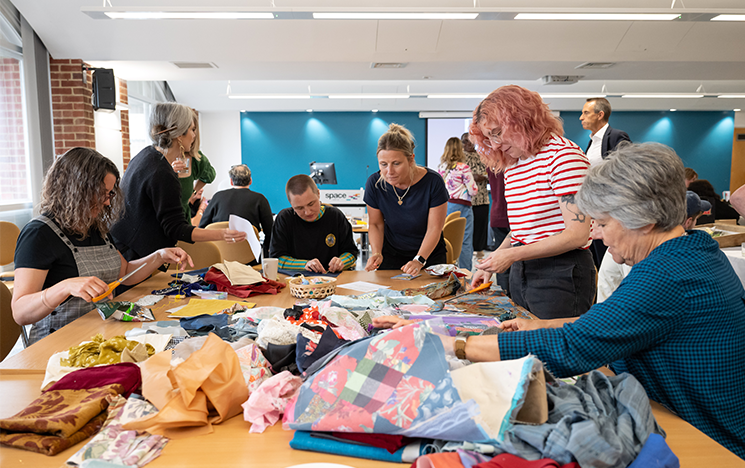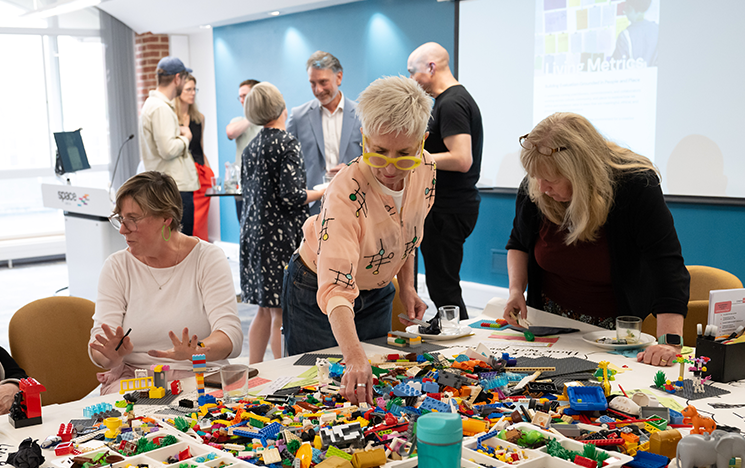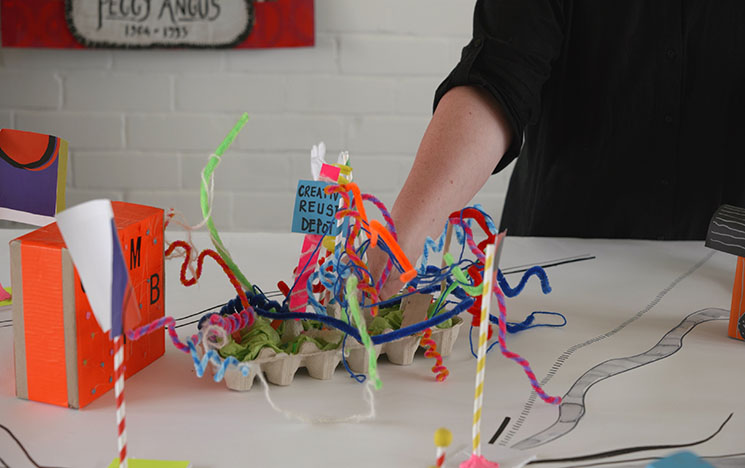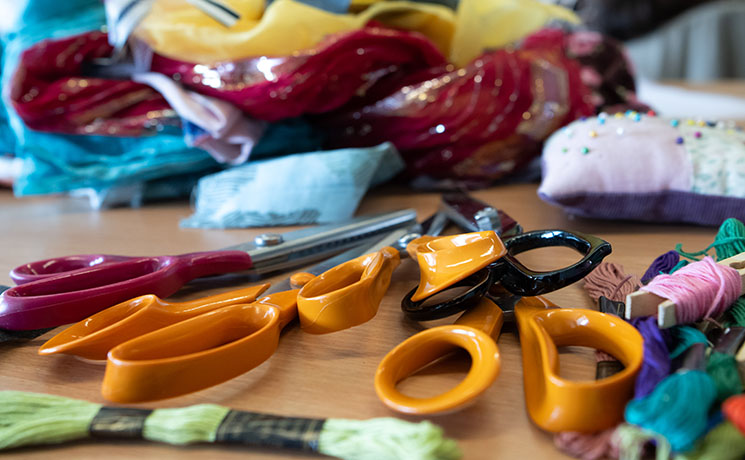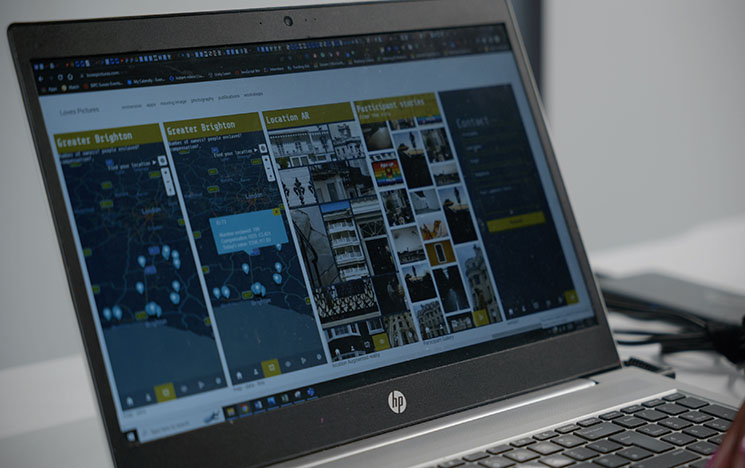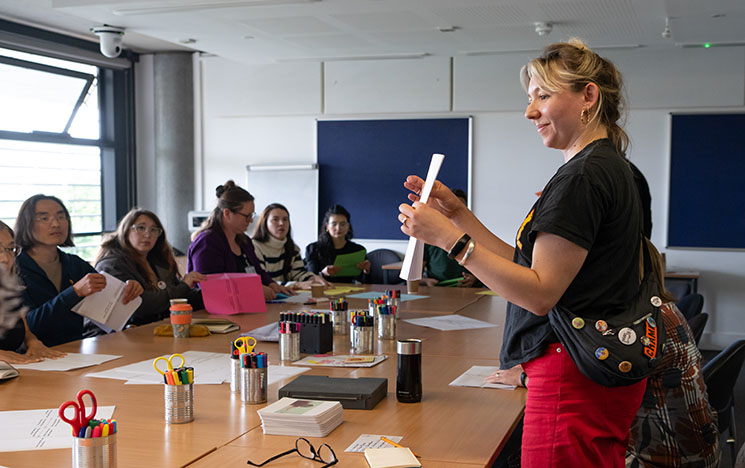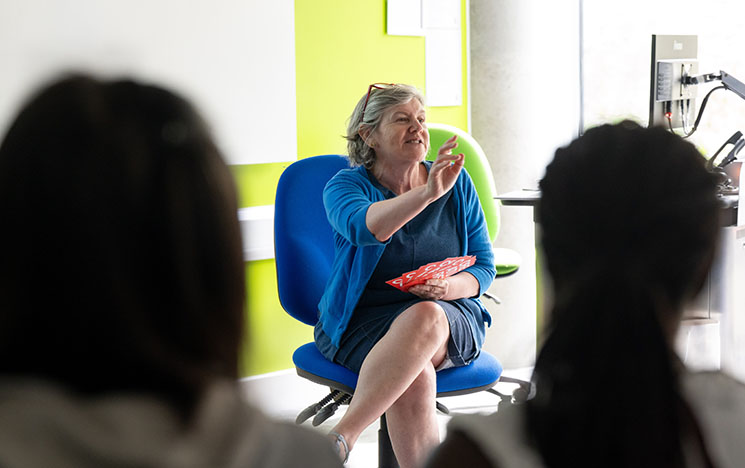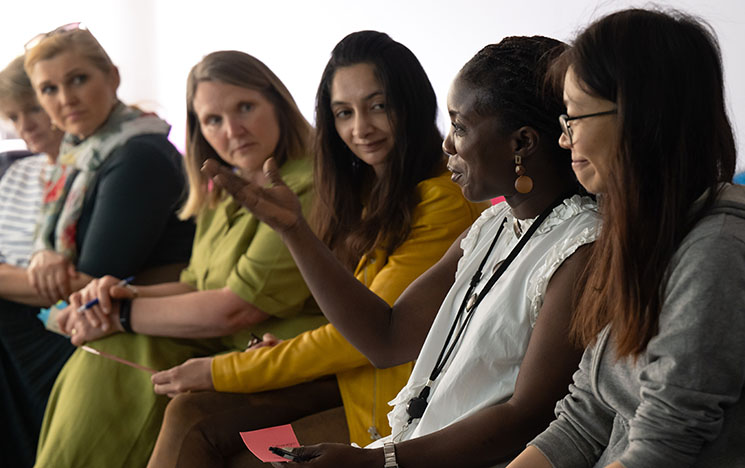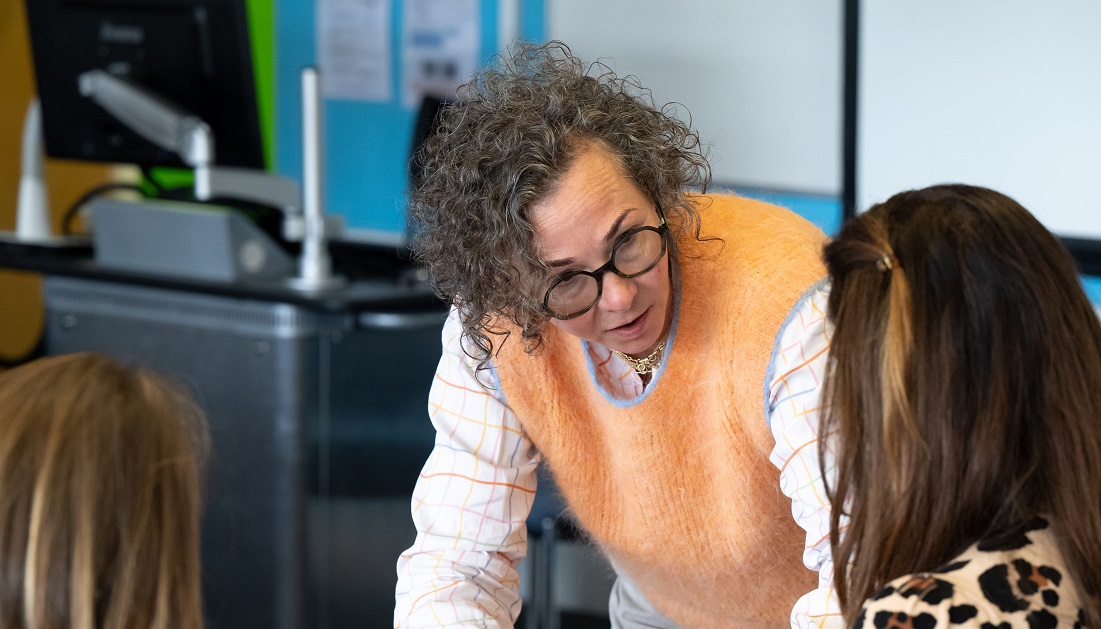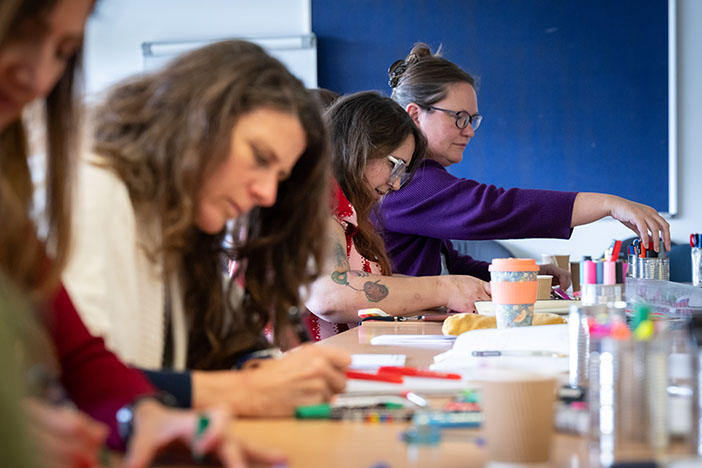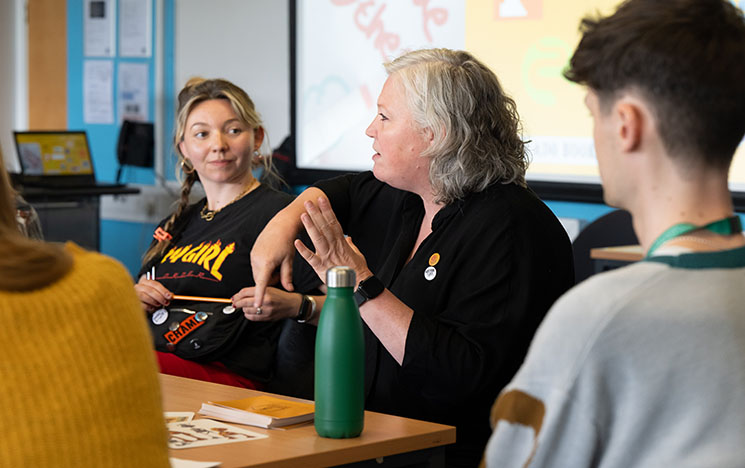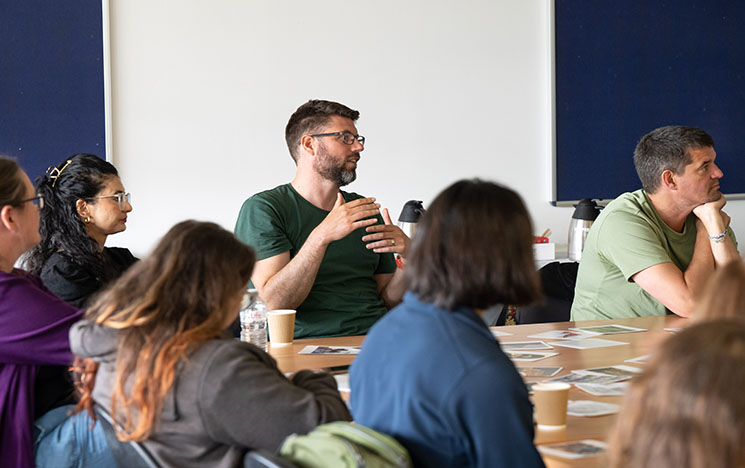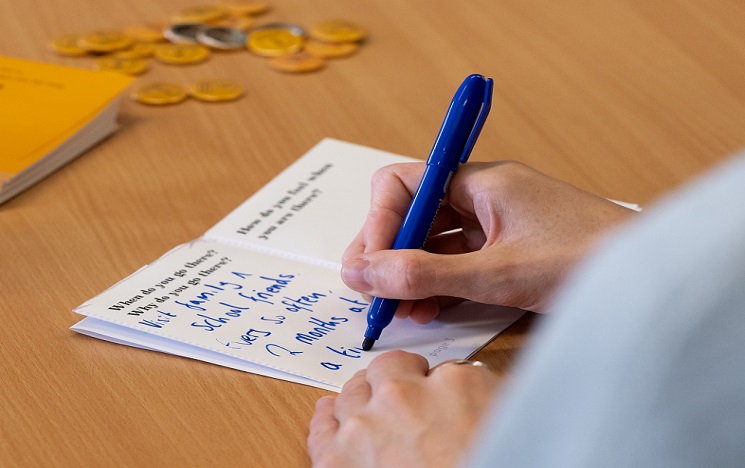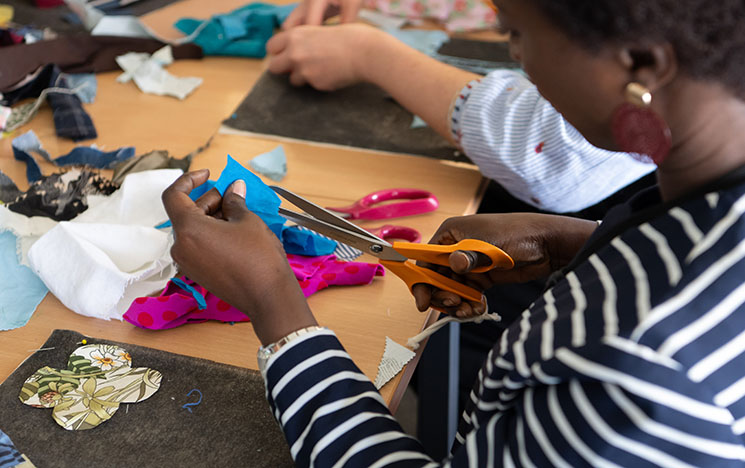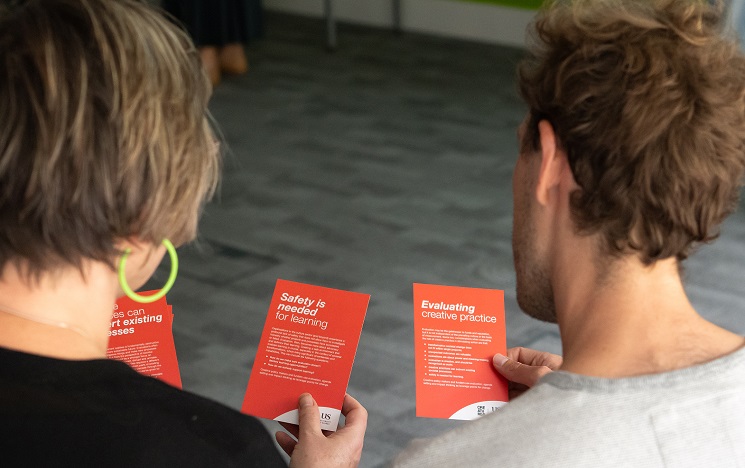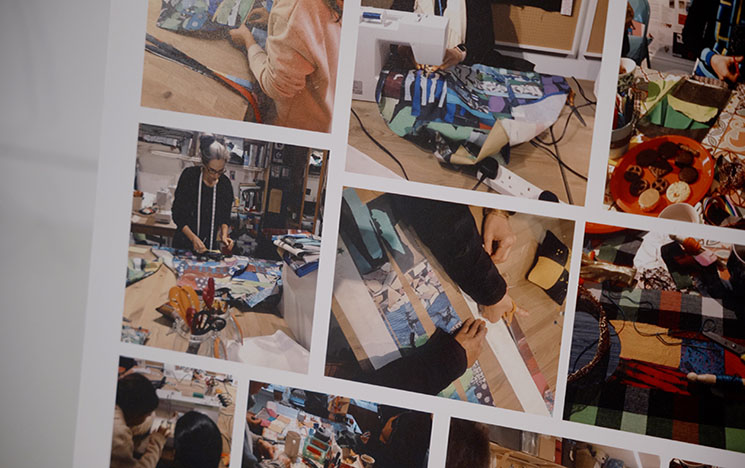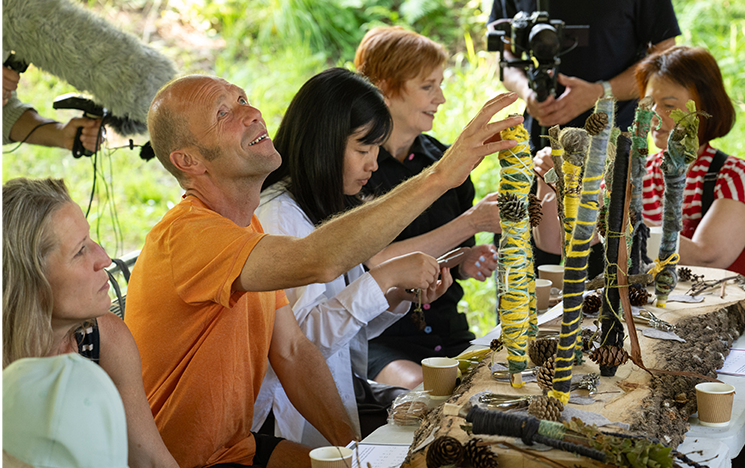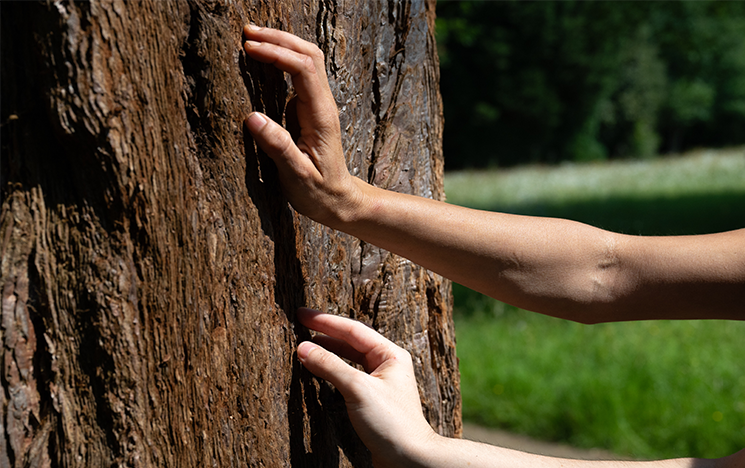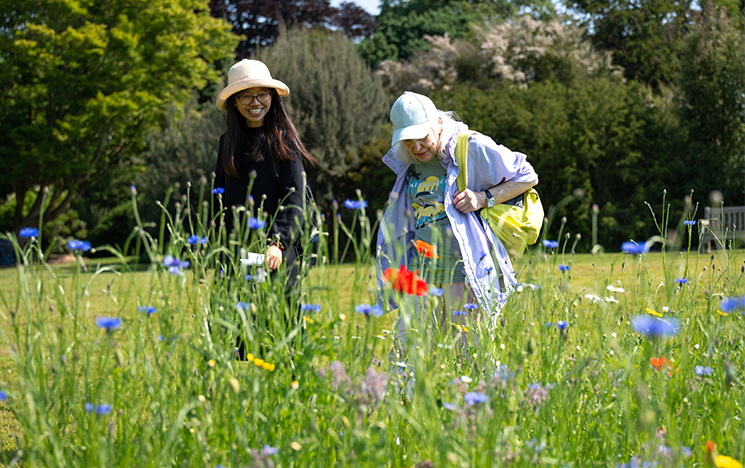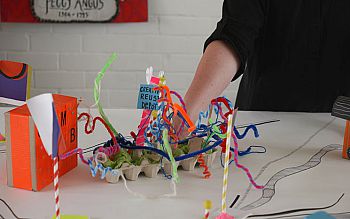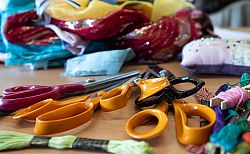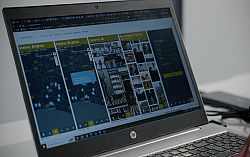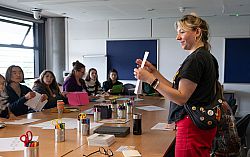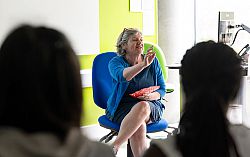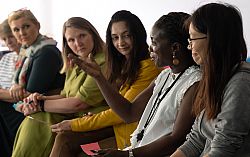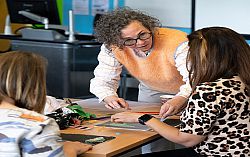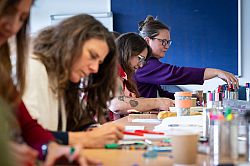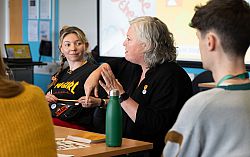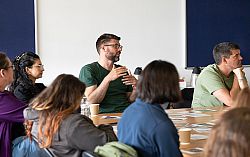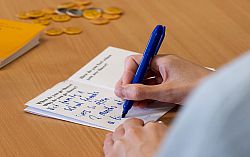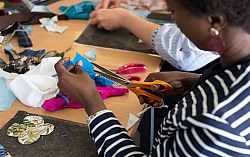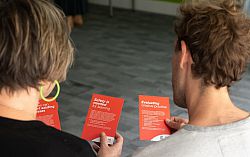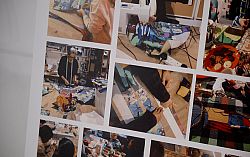Sussex Co-Lab
Sussex Co-Lab is a collaborative programme designed to improve local communities by addressing challenges and making policies more effective.
Bringing together universities, local governments and health partners with businesses, artists, researchers and residents, we use creative and participatory methods to enable more inclusive decision-making. We aim to improve outcomes for local people by testing new ways of working that can help everyone to flourish.
Based at the University of Sussex, we encourage people to share their knowledge and experiences while helping communities and organisations to connect with our research.
Introducing the Sussex Co-Lab
- Video transcript
Video clip of University of Sussex campus from the air with Brighton in the distance.
Video clip of a busy urban street.
Voiceover of Professor Debbie Keeling with video clips of towns, villages, countryside and coastal scenes in Sussex.
Debbie Keeling: The world is a complex and difficult to comprehend place and it's changing more rapidly than ever.
Climate change questions our very existence and the gap between those that have and those that don't is accelerating, and some communities are feeling very left behind.
We need to find new ways of connecting people to the place where they live and they work and to make our communities a starting point for finding innovative solutions to imagining a different future.
Sussex Co-Lab is a programme of work designed to improve local communities in Sussex by building collaboration between universities, local governments, health partners, businesses, artists, researchers and community members.
It focuses on addressing community challenges and making local policies more effective using creative and participatory methods that enable true, inclusive decision-making.
It aims to improve outcomes for the people of Sussex and beyond by testing new ways of working that help all people to flourish and to understand and evidence the impact of this.
This knowledge base will help policymakers, planners and the commissioners of services understand the value and the importance of making people the starting point for change.
Sussex Co-Lab operates as a virtual lab that invites and welcomes in a wide range of contributors to share their knowledge and experience and to get involved in the work of the lab.
It recognises that we're all experts in the place where we live, that we all bring something valuable into the process of understanding people and the conditions that we all need to live full and happy lives.
Video clip of Birling Gap and the Seven Sisters.
End card of the University of Sussex logo.
Working with place
Communities across our region face a range of social challenges such as poverty, inequality, and limited employment opportunities, along with housing, food and fuel insecurity - all against the backdrop of a natural environment under threat.
While traditional policymaking often neglects the insights of local residents, at Sussex Co-Lab, we encourage a more inclusive approach to solving local problems.
Working as a virtual lab, we emphasise the importance of social engagement and community input from the very beginning of our initiatives, welcoming a range of diverse insights to shape effective work.
We consider how creative and participatory approaches can:
- resolve community tensions
- address power imbalances
- improve the design and management of people, place and nature.
We explore methods and models that build resilience and create communities where everyone can thrive – helping commissioners, policymakers and decision-makers to understand the impact of working in innovative ways.
Get involved
If you’re interested in learning more about the work of Sussex Co-Lab, or if you’d like to get involved in our work, please get in touch. We’re particularly interested in connecting with:
- local authorities
- creative practitioners
- community groups in and around our local area
- health organisations
- businesses
- organisations outside the local area who are interested in what we’re trying to achieve.
If you'd like to find out more please e-mail publicaffairs@sussex.ac.uk .
The Co-Lab in action
Find out more about the work of our Co-Lab.
Building connection
The Intergenerational Exchange Programme connects young people and adults through workshops and meet-ups that foster mutual understanding and community participation. Delivered in partnership with local community leaders and stakeholders, the programme addresses social isolation, mental health, and youth disengagement, while supporting healthy aging and inclusive, age-friendly communities.
Being part of the Intergenerational Exchange Programme has been incredibly rewarding. I’ve learned so much from my partner’s life experiences, and it’s helped me feel more connected to my community. It’s not just about giving; it's been a true exchange.”Student participant
The Intergenerational Exchange Programme
For more information, contact Jessica Hadjis van Thiel on J.Hadjis-Van-Thiel@sussex.ac.uk.
Building connection and belonging, across generations to improve wellbeing
- Video transcript
Emilia: We arranged to meet in Shoreham, it was in a lovely little cafe, and I was looking at my WhatsApp being like, "Okay, this is what Diane looks like." I was walking and I was looking, she was reading the newspaper, and I thought, "Oh, okay, that's a good sign."
Diane: I think that gave her an idea that we might get on, which is interesting. So yeah, we talked about what her course was mainly to start with, and being history politics that really piqued my interest.
Jessica: So the Intergenerational Exchange Programme is a programme that started about two and a half years ago at the University of Sussex and what it is is essentially a befriending programme with students that are based at Sussex and older people in the community of Brighton and Hove.
What we're doing is we're connecting them to talk about whatever they like to talk about and they essentially become friends but it's more than that. There are research objectives behind it as as well that align with UK national priorities, which is combating loneliness, healthy aging, well-being, mental health.
Emilia: We've met quite regularly, probably about every couple of weeks or so. We went bird watching, we had pancakes. We've done loads, it's been really exciting.
Diane: It's always handy to have a youngster to help you with phone. I needed to do a screenshot of something this morning, no idea how to do it. Emilia had googled it and done it within 30 seconds, and that would have taken me two days. So all the usual stuff. So it's been great fun.
Jessica: Where it's a little bit different from some of the other befriending programmes that you already have is that we're really putting a sense of purpose on both. So it's not about ongoing and volunteering. It's really about that sense of purpose that older people can also give back to youth. And then equally students are finding that they have a platform in which that they can feel like it's a safe space in exchange for the generation that they would not necessarily organically find out in the community.
So there's a research element to the programme in that we are trying to look at the bigger picture. We're trying to look at the holistic picture of things and how it can feed back into some of the UK national priorities.
We also have workshops. So we would have some that are on campus at the University of Sussex. And those are for new participants that want to sign up. You know, what the objectives of the programme are, why it's important to befriend with older people. That's sort of like the intro workshop.
Ecem: It was really important for me as an international student. I'm coming from Turkey and I have a big family and I have really good relationships with my grandparents. And I felt a need to connect again. So I saw this project and then I became the research assistant.
The project is based on combating the loneliness among the older participants, and then we came up with the idea that actually younger generations are feeling lonely as well. T
Jessica: The second iteration of the workshops is going into the community, so this is something we've just recently started with Hop 50+ Cafe, and they have access to a client base and customer base of older people already.
Vicky: The workshops have been really interesting, you know, we've had two here now.
The topics that we choose are topics that are going to increase meaningful conversation. So the first workshop was about interconnectedness and what that means to people.
The second workshop was focused on well-being in general, and of course these two things very much interlinked. As we know interconnectedness really increases well-being.
People are getting so much out of the conversations, you know, they really report back that, you know, it's meant a lot to them to have these conversations and to mix with people from different generations.
One participant summed it up for me when she said, 'The environment might change over the years, but essentially people remain the same', and it can be easy to forget that across the generations, but we are just that, we're all the same.
Jessica: The amount of knowledge that you can understand and can gain from speaking to someone who's been through it is so important and so we're seeing that for a lot of the students there's that value of going, 'Wow this person has lived', so the learning from that has been exceptional I think.
And then equally for older people to understand and be connected to that generation, that might be their grandchildren's generation, to understand what they're going through from their perspective is I think really, really important.
Ecem: This project of course helped me professionally but at the same time I think it touched me personally on a deeper level because now when I'm back into my home country I'm more connected than my grandparents than before because now I am aware of how would they feel. It's more like I share my stories that I'm going through in my life and they share their stories back then and we have this mutual friendship I would say.
Jessica: Being able to be in this safe space, we're speaking to some of that was a stranger just a few months ago, they've created such a relationship where they feel very safe and to talk about things that they wouldn't otherwise be able to speak with with their family and that goes for both generations.
Diane: Well I think reconnecting with someone who's academically active in their 20s has been really stimulating for me and that makes me feel younger and more involved in things. Plus it's been really nice to hear Emilia's journey through university and the more we've got to know each other, the more we've learned about each other's families as well, it's been really enlightening.
Emilia: We were having a chat about mental health and how she was quite worried about one of her great nieces being on antidepressants at 16. And I said, 'I was there four years ago and now I have different ways to manage my anxiety and here I am making new friends in a project that I never would have done four years ago'.
Jessica: So for me, the takeaway has been really interesting because it does make you want to get involved in the programme. You actually do want to speak with these older people that have this wealth of knowledge, but equally for older people, it's rejuvenating as well. So I think it's been really exciting to see that come out of the programme that we've created this, you know, from this little programme we've created so many meaningful connections. And I think that for next steps for the project, we'd like to scale beyond the University of Sussex, so if we can take this project to other universities, but also in terms of bringing more older people potentially onto campus. So it's really exciting to see where we've come so far and where we could potentially go.
Shaping local development
Anke Schwittay, Professor of Anthropology and Global Development, is an active member of Who Owns Brighton, a project led by the Brighton and Hove Community Land Trust (BHCLT) that is seeking to understand whether developments in the city serve the needs of its residents.
Working with a team of community researchers, the team reflected on the different aspects of the planning and development process to understand the impact between the translation of plans into housing in a place. Using Circus Street in central Brighton as a test site, the team are enabling residents to scrutinise local developments, equipping them with skills and tools that enable them to engage and mobilise at different stages through the planning process.
Using community research to understand local development in Brighton and Hove
- Video transcript
[Intro MUSIC - pizzicato strings]
[TITLE: Who Owns Brighton? Community Research Project]
[Video footage of drone flying over the centre of Brighton and residential areas in the city]
[Martyn Holmes, Project Lead, Who Owns Brighton?] Who Owns Brighton? is a community research project looking at what's happening in the city around development, who's it for, who wins, who loses, where does does the money come from, and where does it go? And very importantly what can we as citizens do about changing some of those outcomes?
[Video footage of Helen and Martin working on laptops on the Who Owns Brighton project]
[Helen Bartlett, Project Lead, Who Owns Brighton?] Our aim was to develop a community-led research methodology which would give people tools, knowledge, and skills to kind of look at and scrutinise different aspects of the planning and development process and different points at which they could intervene and mobilise.
[Video footage of drone flying over Circus Street development in Brighton and ground level shots]
[Professor Anke Schwittay, School of Global Studies, University of Sussex, Steering Group Member for Who Owns Brighton? and Director, Brighton & Hove Community Land Trust] So we decided it was really important to try out our methodology in a particular site, and the site that was chosen is Circus Street, which is a development in the centre of Brighton. There were lots of promises and lots of kind of ideas around Circus Street as becoming a very lively neighbourhood. It's really anything but that.
[Shaulan Chanlewis, Community Researcher, Who Owns Brighton?] I feel like there's a lot of potential but it didn't blossom, it hasn't blossomed. It's not vibrant. The units are empty, the retail units, which is a real shame.
[Video footage of the Who Owns Brighton Workshops]
[Martyn Holmes] We ran a series of workshops where we had experts come along to talk about the different aspects of the development process to sort of demystify those, essentially and so that people could learn, like how does planning work, how does development finance work? How do the decisions get made in the local authority, for example? How can you go online and find out who owns things, you know, where does the money come from? Where does it go? And then we kind of, people got interested in various bits of that and then they formed groups together, and then we sort of oversaw that process as they went away and investigated those parts of the development process.
[Shaulan Chanlewis] The project was just run in such a kind of friendly way. It was really easy to be involved. It kind of started with workshops. So kind of giving everyone a chance to get to know each other and to get a feel for what being a community researcher would be like.
[Video footage of Anke Schwittay working on campus at University of Sussex]
[Professor Anke Schwittay] The involvement of the University of Sussex was very much facilitated through the Sussex Co-Lab. The Co-Lab is all about developing these kind of participatory methodologies that bring university actors together with community groups, with residents around different topics that are of resonance to local people.
[Video footage of drone flying over the centre of Brighton and Circus Street development and ground level shots]
[Martyn Holmes] For most people in Brighton, there is an acute housing crisis. It's an expensive place to buy. It's a very expensive place to rent. There's lots of people on the housing register so there's a shortage of supply of social housing, and really, housing is a key, fundamental thing for so many people's lives, and people are being pushed out.
[Professor Anke Schwittay] The commercial housing in Circus Street was through shared ownership schemes which are meant to be affordable housing schemes and the things that we learned, they absolutely aren't. And there's a large debate, especially around kind of service fees and the way that service fees are not capped and have been massively increasing, really trapping people in these properties.
[Helen Bartlett] We had councils that were committed to affordable housing. They talked about the importance of affordable housing. There are policies that say, you know, it needs to be affordable. And yet every single new development in the city was not producing that policy compliant issue, let alone more.
[Professor Anke Schwittay] One of the things that really emerged from the research was the gap between what is being promised by developers and architects with their fantastic drawings before any development happens and the reality, which really is quite different. We have quite empty commercial spaces that are not contributing to the economic regeneration of the area. We have public spaces that are really quite lifeless and empty.
[MUSIC change - more upbeat pizzicato strings and guitar]
[Professor Anke Schwittay] So one of the things we have been thinking about and want to propose is some kind of a post development assessment and audit that really the council looks like what's the difference between what is being promised and what is being delivered and what can be done if that gap is really big to make sure that developments are really delivering on the promises they are making.
[Video footage of the Who Owns Brighton Workshops]
[Martyn Holmes] I think it's created solidarities between people which is really important, and it's kind of inspired people to go on and want to focus around a certain things so mobilise maybe around a certain site or around policy change or around, you know, all the different ways that change can kind of be enacted on the ground.
[Video footage of Helen and Martin working on laptops on the Who Owns Brighton project]
[Helen Bartlett] Well, we very much have come from the position that actually in order to change this, and in order to change this within our city we need to be having those, sometimes difficult, sometimes critical but constructive conversations across different sectors and different industries. But also bringing in some of the other bodies some of the other kind of stakeholders in that aspect of development in the city. So obviously, we've got the two universities who are support supporting the project.
[Video footage of Anke Schwittay working on campus and general shots of the campus at University of Sussex]
[Professor Anke Schwittay] It really made me realise the contribution that universities can have in their local communities producing these tools, empowering people to learn about what's happening to unpack some of these really complicated processes, and then to take action on that.
[Professor Anke Schwittay] Through the University of Brighton, we have actually submitted a large research grant to the ESRC to scale the project across all of Brighton to also put together a website to share the findings much more, much more widely beyond Brighton. So the hope is that this is really something that can be of help to people in other cities, to similarly want to understand what's happening there.
[Video footage of drone flying over the centre of Brighton and residential areas in the city]
[END LOGOS - University of Sussex]
More Co-Lab projects
- Living metrics evaluation workshop
The living metrics evaluation workshop, facilitated by Hospitable Environment and Cara Courage and commissioned by Sussex Co-Lab, brought together a diverse group of artists, commissioners, council officers, and community practitioners from across Sussex.
Through a day of creative enquiry and critical reflection, participants unpacked the limitations of current evaluation systems, which was felt, too often, to be top-down, overly bureaucratic, and disconnected from the lived realities of community work. Many shared that existing models prioritise quantifiable outputs over meaningful change, extract stories without reciprocity, and burden grassroots organisations with administrative demands that detract from their core purpose. These critiques were felt by the workshop to distort what counts as value but also silence voices, reinforcing inequities, and undermining trust.
In response, participants collectively began to reimagine evaluation as a more relational, inclusive, and justice-driven practice—one centred on learning, reflection, and shared ownership. They highlighted the urgent need for co-created tools, shared language, and cross-sector collaboration, as well as for accessible and smart technologies to ease the burden of data capture. The workshop marked a meaningful step toward building an evaluation culture rooted in equity and care, with a clear next step: to develop a shared resource for Sussex that supports knowledge exchange, mutual learning, and long-term transformation.
Read the report [PDF 754.40KB] to learn more.
- Woven landscapes, connected threads, interlacing culture, community and place
On 29 May 2025, over 80 community groups, creative and participatory practitioners, researchers, representatives from organisations across Sussex and elected representatives celebrated working with communities to transform the places where they live and work.
The power of using creative and participatory methods and models to bring about meaningful change was explored, highlighting their positive impact on the individuals involved and the value in helping to work across organisational boundaries to develop shared visions. The knowledge and shared learning from the day has helped craft guiding principles to working with people and place [PDF 81.62KB] to inform approaches moving forward. Dr Cara Courage, Culture, Community and Place Consultant, also comments on the thoughts and reflections on the day in the woven landscapes blog post [PDF 31.16KB].
- Co-Lab residencies - Urban Fabric
Urban Fabric was formed by two organisations based in Brighton’s Open Market: textiles studio, Sew Fabulous, and creative charity, Quiet Down There. Together, they collaborated with local people to develop a fabric that could represent feelings about the changing face of London Road.
Having co-created over 60 textile artworks. Sew Fabulous digitally arranged a design that offered a visual representation of community experiences across London Road and the wider city. The resulting fabric was then used to make aprons modelled by traders across the marketplace.
By generating a composite design, the fabric offered a visual response to a difficult set of questions around changing spaces and cultures, and represents the creativity of participants who responded to questions about their environment for the first time.
By taking the aprons into the market, the project started to locate those creative instincts in our public space. The final artworks are powerful visuals which support the consideration of people’s thoughts, feelings and creativity in the public realm.” Lucy Jeffries and Susie Deadman - Co-Lab residencies - Xr-H
Working in collaboration with the Centre for Memory, Narrative and Histories at the University of Brighton, digital artist Judith Ricketts developed Xr-H: a first-stage, augmented reality (AR) app designed to uncover both the real and imagined threads of Brighton’s hidden past.
As a first-generation Afro-Caribbean born in the UK, Judith grew up in a space that denied her Britishness associated with her Blackness.
This residency aimed to develop a sustainable approach to creative placemaking influenced by both her personal experiences and the absence of records detailing Black contributions to the local Sussex region – a region which flourished with the Atlantic Slave Trade at its heart during the Georgian period.
These hidden histories of people and place should be considered in the process of planning to prevent further erasure.” Judith RICKETTS - Co-Lab residencies - Hospitable Environment
Community arts organisation Hospitable Environment worked with local people in Newhaven to reimagine their town through a residency that focused on live design projects that could feed into the local planning process for Lewes District Council.
Using their ‘soup and social’ model of shared meals and community conversations, participants were invited into a process that enabled them to explore and map their favourite places in the area.
After imagining what their town might look like in future, 3D junk modelling was used to bring their visions to life.
Through this residency, we’ve evidenced how working as an established and trusted community group can feed into and inform the planning and placemaking process. We’ve facilitated genuinely place-based research through socially-engaged community forums and events” Lizzie lower and Eleanor Johnson Bullock - Using comic making to explore connection and meaning
Dr Chris Sandom, Associate Professor in Biology, and his collaborator Daniel Locke have been using comics and comic making to enable people to talk about climate change and feelings around a sustainable future.
Comics help people engage with a topic, enabling them to get involved in the discussion. Co-creating them as a group can make hidden emotions, attitudes, and experiences that we all hold visible, helping to challenge world views and reimagine more hopeful and positive futures.
As a methodology, both Chris and Daniel have worked together, using comics that combine both science and art in a way that enables connection with place.
Examples of projects
- Using creativity to evaluate creative practice
Ann Light, Professor of Design and Technology, was part of a team of researchers from across Europe who explored the use of creative practice to unlock environmental and social change, helping to transform people and places.
As part of the Creatures programme, the team co-created a tool that enables creative practitioners, funders, policy makers and researchers to evaluate links between using creative practice and social change in an inclusive and participatory way.
For more information, contact ann.light@sussex.ac.uk.
- Pathways to inclusion in the heritage sector
This project explores how arts can improve access to, and enjoyment of, landscapes and heritage sites for sight impaired visitors. It invites us to think differently about landscapes and heritage. Led by Dr Karis Jade Petty, an Anthropologist at the University of Sussex and an Inclusive Arts Practitioner and Nature-Connectedness Facilitator, a pilot project was launched in summer 2024, in partnership with Wakehurst.
Get in touch with k.petty@sussex.ac.uk if you'd like to collaborate or are seeking consultancy.
The relationships and learning gained through this partnership have shaped our landscape management plans, project design, and delivery.” harri oliver
Participation Manager, Wakehurst
How the Sussex Co-Lab started
Sussex Co-Lab was founded in 2023 as a pilot project funded through an ESRC Impact Acceleration Account. As a first step, we commissioned three residencies for artists using creative practice to frame conversations around sustainability.
Since then, we’ve been working with our partners to build a vision for the future that includes:
- trialling different methods and models to understand how we can best work with people and place
- co-designing evaluation approaches to better understand impact
- sharing our collective knowledge about what works with others to enhance collaborative placemaking and policy development both in and beyond our region.
A digital workbook has been created to guide creative placemaking: Sussex Co-Lab Workbook [PDF 5.54MB].
The Sussex Co-Lab
Photos of Sussex Co-Lab
